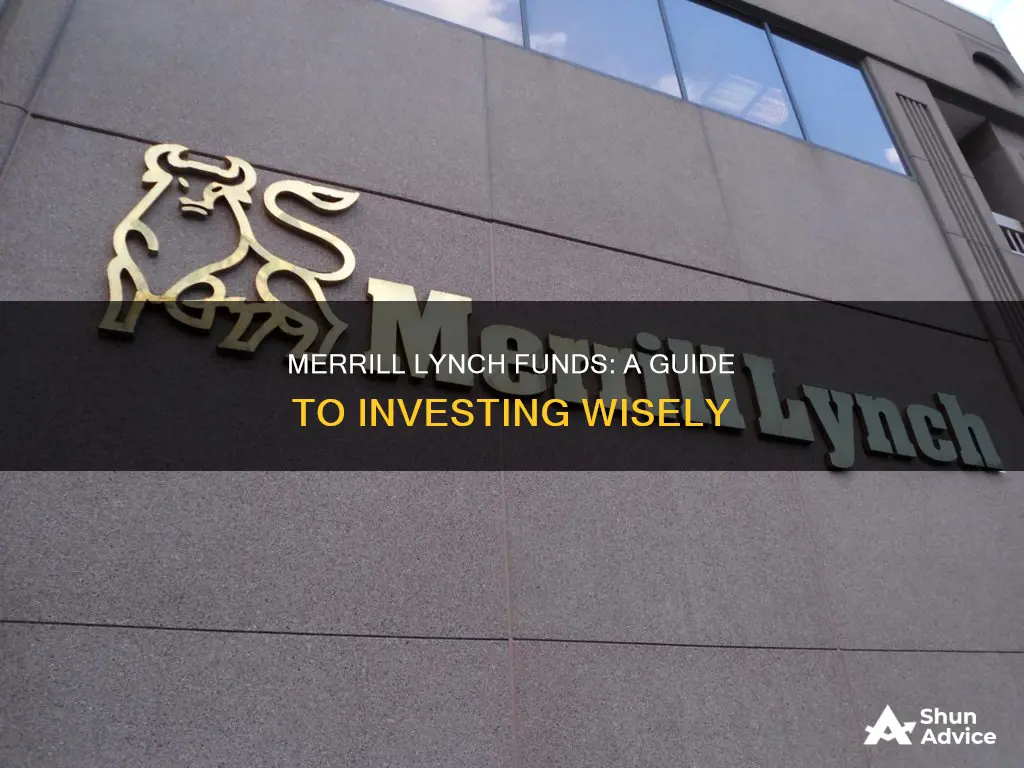
Merrill Lynch Wealth Management offers a range of investment solutions to help clients achieve their financial goals. With access to a dedicated advisor, clients can receive investment choices that align with their objectives, liquidity needs, risk tolerance, investment time horizon, and financial situation. Merrill Lynch's investment advisory program provides a professionally managed portfolio, where investment professionals will build, monitor, and rebalance your portfolio to help you grow your wealth. The firm also offers a wide array of investments, including equities, exchange-traded funds (ETFs), fixed-income securities, unit investment trusts, and alternative investments. Merrill Lynch's integration with Bank of America provides a seamless experience for clients, allowing them to view their accounts with a single login. Additionally, they provide educational resources and tools to help investors make informed decisions.
What You'll Learn

Investment advisory programs
Merrill Lynch offers a range of investment advisory programs to meet your needs, whatever your comfort level. These programs provide access to various investment strategies, resources, and insights to help you pursue your financial goals.
The Merrill Lynch Investment Advisory Program offers a personalised approach to investing, tailored to your goals, values, risk tolerance, and timeline. This program provides access to professionally managed portfolios and separately managed accounts, a wide range of investment solutions (including stocks, ETFs, bonds, mutual funds, tax-efficient strategies, alternative investments, and annuities), world-class insights, tax-efficient management services, and ongoing monitoring and regular reviews of your investment advisory account.
The Merrill Guided Investing program is another investment advisory program that offers personalised investing with insights, guidance, and tools to put your investing ideas into action. Through this program, you can get a professionally managed portfolio that is monitored and rebalanced by Merrill investment professionals, with the option to receive additional guidance from an advisor.
Additionally, Merrill offers brokerage services and the option to work with a dedicated advisor from Merrill Lynch Wealth Management to provide one-on-one guidance and help you develop a comprehensive strategy.
To determine the right approach for your needs, you can refer to the Client Relationship Summary (Form CRS) or schedule a discussion with a financial advisor.
Maximizing Investment Returns: Strategies for Utility-Focused Investors
You may want to see also

Investment choices
As a Merrill client, you will be assigned a dedicated advisor who will provide you with investment choices that align with your investment objectives, liquidity needs, risk tolerance, investment time horizon, and financial situation. Your advisor will work with other investment professionals in the firm to recommend actionable investment solutions to help you achieve your investment goals.
You will have access to a wide array of investments that can potentially generate income and diversify your portfolio. These include equities, exchange-traded funds (ETFs), fixed-income securities, unit investment trusts, and more.
- Equities: These represent an ownership interest in a publicly traded corporation or pooled investment vehicle and may offer growth potential to help you meet longer-term goals. Examples include common stock, exchange-traded funds, closed-end funds, certain listed preferred stocks, and American Depositary Receipts.
- Exchange-Traded Funds (ETFs): ETFs are a type of pooled investment vehicle designed to track an index or be actively managed. They trade on an exchange like a stock throughout the trading day and can hold a diversified group of assets, including equities, fixed income, commodities, currencies, or options.
- Fixed Income Securities: These include bonds issued by companies, governments, states, and municipalities. They represent the issuer's promise to repay the bond face amount, with interest, within a set period. Examples include U.S. treasury securities, corporate bonds, and municipal debt securities.
- Unit Investment Trusts: These are static portfolios of securities that are professionally selected by a manager to implement a specific investment strategy. They offer daily redemption at the net asset value (NAV).
- Concentrated Stock Solutions: These include tax-efficient hedging, monetization, and diversification strategies to help you manage the risks of holding a large position in a single stock.
- Risk Management Solutions: These include options overlay strategies, exchange funds, and hedging strategies to reduce portfolio volatility, diversify holdings, or mitigate the impact of fluctuating exchange rates and market conditions.
- Closed-End Funds (CEFs): CEFs are a type of registered investment company that uses an asset manager to meet specific investment objectives. They are traded on an exchange, providing investors with intra-day liquidity at market prices.
- Brokered Certificates of Deposit (CDs): Brokered CDs are deposit instruments issued by banks or savings associations that pay periodic interest at a fixed rate for a specified period.
- Market Linked Investments (MLIs): MLIs are debt instruments linked to the performance of an underlying market measure, such as an index, with targeted risk and return characteristics.
- Alternative Investments: These include non-traditional investment vehicles such as hedge funds, private equity funds, and real assets. They offer exposure to a broader range of markets and securities and may employ strategies not typically found in registered investment companies.
Additionally, as a Merrill client, you will have access to educational resources, such as articles, courses, videos, webinars, and free tools to help you make informed investment decisions.
Dimensional Fund Investing: What Products Are Offered?
You may want to see also

Investment solutions
Merrill offers a range of investment solutions to help you pursue your financial goals. Here are some of the key investment solutions provided by Merrill:
- Dedicated Advisor: As a Merrill client, you will be assigned a dedicated advisor who will provide investment choices that align with your objectives, liquidity needs, risk tolerance, investment time horizon, and financial situation. Your advisor will work with other investment professionals at the firm to recommend actionable investment solutions.
- Access to a Wide Array of Investments: Merrill provides access to a diverse range of investments, including equities, exchange-traded funds (ETFs), fixed-income securities, unit investment trusts, and more. These investments offer potential income generation and portfolio diversification.
- Customized Investment Strategies: Merrill advisors tailor their recommendations to your specific needs, helping you implement a comprehensive investment strategy. This includes access to sales traders who aim to provide best execution results.
- Sophisticated Approaches for Complex Needs: Merrill can assist with more complex investment needs, such as hedging a concentrated stock position, through various sophisticated approaches.
- Equities: Equities represent an ownership interest in a publicly traded corporation or pooled investment vehicle. They include common stock, exchange-traded funds, closed-end funds, certain listed preferred stocks, and American Depositary Receipts.
- Exchange-Traded Funds (ETFs): ETFs are pooled investment vehicles that can track an index or be actively managed. They trade on an exchange throughout the day and can hold a diversified group of assets, providing flexibility and broad market exposure.
- Fixed Income Securities: These include bonds issued by companies, governments, states, and municipalities. Fixed-income securities offer a steady income stream, with the promise to repay the bond face amount, plus interest, within a set period. Examples include treasury securities, corporate bonds, and municipal debt securities.
- Unit Investment Trusts (UITs): UITs offer a static portfolio of securities professionally selected by a manager to implement a specific investment strategy. They provide daily redemption at the net asset value (NAV).
- Concentrated Stock Solutions: Merrill provides strategies such as tax-efficient hedging, monetization, and diversification to help manage the risks associated with holding a large position in a single stock.
- Risk Management Solutions: Merrill offers options overlay strategies, exchange funds, and hedging strategies to help reduce portfolio volatility, diversify holdings, and protect against fluctuating market conditions.
- Closed-End Funds (CEFs): CEFs are registered investment companies that use asset managers to meet specific investment objectives. They are traded on exchanges, providing investors with intra-day liquidity at market prices.
- Brokered Certificates of Deposit (CDs): Brokered CDs are deposit instruments issued by banks or savings associations, offering periodic interest payments at a fixed rate for a specified period.
- Market Linked Investments (MLIs): MLIs are debt instruments linked to the performance of underlying market measures, such as indices, with targeted risk and return characteristics.
- Alternative Investments: Merrill provides access to non-traditional investment vehicles, including hedge funds, private equity funds, and real assets. These investments offer exposure to a broader range of markets and securities and may employ strategies not typically found in registered investment companies.
- Retirement Planning: Merrill provides digital tools and resources to help you plan for retirement. Their advisors can assist in developing a comprehensive retirement plan and ensuring you're on track to meet your retirement goals.
- Educational Resources: Merrill Edge offers educational articles, courses, videos, webinars, and free tools to help investors make informed decisions. Their Idea Builder tool assists newer investors in finding investments that align with their interests and values, such as ESG (environmental, social, and governance) products.
- Integration with Bank of America: Merrill Edge, a product of Bank of America's acquisition of Merrill Lynch, offers a seamless experience for clients using both services. You can access and manage your Bank of America and Merrill Edge accounts with a single login, providing a holistic view of your financial situation.
Mutual Funds vs Real Estate: Where Should You Invest?
You may want to see also

Risk management
Investing with Merrill Lynch provides access to a wide range of investment opportunities, including stocks, bonds, and alternative investments. While investing can provide the potential for significant financial gains, it is essential to remember that all investments carry some degree of risk. Here are some key considerations regarding risk management when investing in Merrill Lynch funds:
Risk Tolerance Assessment
Merrill Lynch offers a comprehensive approach to understanding your risk tolerance. They provide tools and insights to assess your comfort level with different types of investments and associated risks. This assessment helps create an investment plan tailored to your specific needs and risk tolerance.
Diversification Strategies
Diversification is a fundamental concept in risk management. Merrill Lynch advisors can help you build a diversified portfolio across various asset classes, sectors, and industries. By spreading your investments, you can reduce the impact of specific risks associated with individual investments or market sectors.
Alternative Investments
Merrill Lynch offers alternative investments that can provide higher return potential but also carry higher risks. These include derivatives, hedge funds, private equity funds, and funds of funds. Before investing in these options, it is crucial to consider your financial situation, liquidity needs, and risk tolerance carefully.
Risk Mitigation Strategies
Merrill Lynch offers risk mitigation strategies to help you manage the impact of changing interest rates. They provide customizable interest rate hedging strategies and tax-efficient diversification approaches. These strategies aim to reduce the risks associated with holding large positions in single stocks or interest-rate-sensitive investments.
Advisory and Guidance
Merrill Lynch provides access to dedicated advisors who can offer guidance and help you navigate complex investment decisions. Their expertise can assist in understanding the risks associated with different investment options and making informed choices.
It is important to remember that while risk management strategies can help mitigate potential losses, they cannot eliminate all risks associated with investing. Investing in Merrill Lynch funds still carries the possibility of financial loss, and it is essential to carefully consider your own risk tolerance and financial goals before making any investment decisions.
UK Hedge Fund Investment: Getting Started and Strategies
You may want to see also

Tax implications
Taxes are an important consideration when investing in Merrill Lynch funds. While Merrill, its affiliates, and financial advisors do not provide legal, tax, or accounting advice, here are some key tax implications to keep in mind:
- Tax-deferred vs. taxable accounts: The investment income earned on assets held within a tax-deferred account, such as a 401(k) or IRA, is generally not taxable until you withdraw it. On the other hand, income from taxable accounts, such as interest payments on bonds and cash, is taxed at individual rates of up to 37%. Understanding the tax treatment of different types of assets can help you make informed decisions about where to hold your investments.
- Ordinary income vs. long-term capital gains: Ordinary income, including interest on bonds and cash, is taxed at higher rates than long-term capital gains, which are profits from selling stocks held for more than a year. Long-term capital gains have a maximum tax rate of 20%.
- Net investment income tax: Both ordinary income and long-term capital gains may be subject to an additional 3.8% net investment income tax.
- Holding period: Holding a stock for less than a year before selling it can result in the profit being taxed as ordinary income, rather than the lower long-term capital gains rate. Therefore, it is generally advisable to hold stocks for more than a year to benefit from the lower tax rate.
- Tax-loss harvesting: If you sell investments that have dropped in value, you may be able to take advantage of tax-loss harvesting to offset taxable gains. This strategy can help reduce your tax liability.
- Retirement accounts: Leaving funds in your retirement accounts, such as a 401(k) or IRA, for as long as possible allows your investments to grow on a tax-deferred basis. You can generally avoid taking required minimum distributions (RMDs) from these accounts until you reach the age of 73.
- Charitable donations: Donating appreciated shares of stock directly to charity can help you avoid capital gains taxes while still receiving a tax deduction for the fair market value of the stock. Additionally, if you are retired and over the age of 70½, you can make a Qualified Charitable Distribution (QCD) of up to $100,000 directly from your traditional IRA to a qualified charity, potentially reducing your taxable income.
- Consult a financial advisor: It is important to consult with a financial advisor or tax professional to understand the specific tax implications of investing in Merrill Lynch funds and to determine the most tax-efficient strategies for your situation.
SP 500 Index Funds: A Smart Investment Choice
You may want to see also
Frequently asked questions
Merrill Lynch is a wealth management and financial services company. It was acquired by Bank of America and now operates as Merrill Edge, offering investment solutions, trading, guidance and tools.
Merrill Lynch provides access to a dedicated advisor who will help you pursue your investment goals. They offer a wide array of investments, including equities, exchange-traded funds (ETFs), fixed-income securities, and alternative investments. They also provide educational resources and 24/7 customer support.
Merrill Edge does not offer fractional shares, which can make it more difficult and expensive to diversify your portfolio. Additionally, advanced traders may find a limited selection of securities.
Merrill Lynch offers various accounts, including brokerage accounts, retirement accounts such as IRAs, and investment advisory programs.
You can get started by visiting the Merrill website or the Bank of America website, as the two companies are integrated. You can also reach out to their customer support to get more information and guidance on how to proceed.







